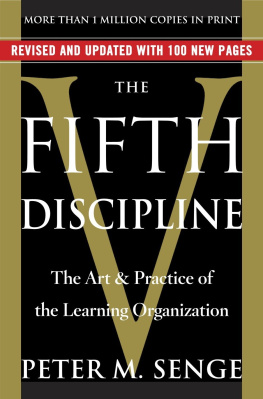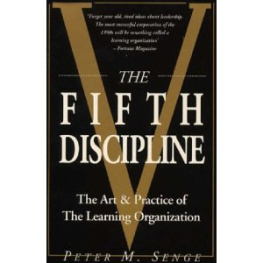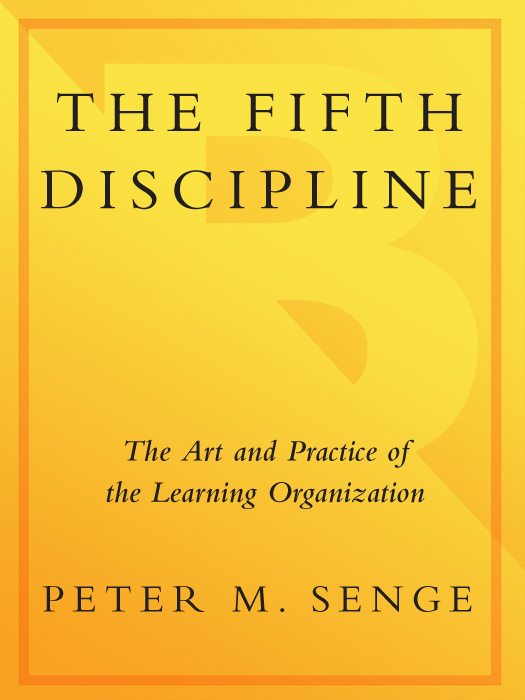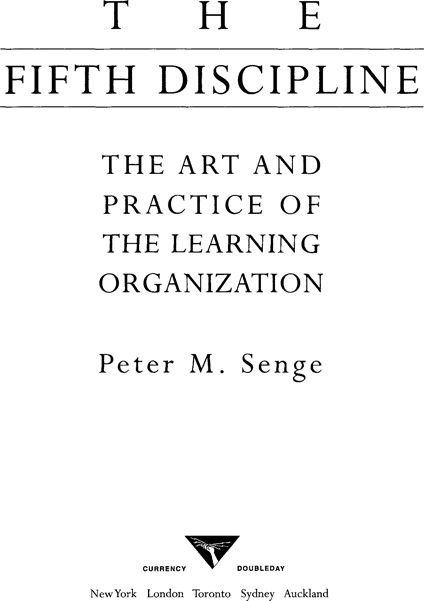INTRODUCTION TO
THE REVISED
EDITION
THE PREVAILING SYSTEM OF MANAGEMENT
In the spring of 1990, shortly after the writing and editing of the original edition of The Fifth Discipline was completed and publication was imminent, my editor at Doubleday asked me who I wanted to write a comment for the book jacket. As a first time author, I had never considered this. After thinking for a while I realized that there was no one I would rather have write something than Dr. W. Edwards Deming, revered around the world as a pioneer in the quality management revolution. I knew of no one who had had a greater impact on management practice. But I had never met Deming. I doubted that a letter with such a request from an unknown author, referring to work with which Deming was unfamiliar, would get a favorable response. Fortunately, through mutual friends at Ford, a copy of the manuscript did reach him. A few weeks later, to my surprise, a letter arrived at my home.
When I opened it I found a short paragraph written by Dr, Deming. Reading the first sentence, I stopped to catch my breath. Somehow he had said in a sentence what I had struggled to put into four hundred pages pages. It is amazing, I thought, how clear and direct you can be when you reach the end of your years (Deming was then almost 90). As I took in the totality of what he had written, I slowly started to realize he had unveiled a deeper layer of connections, and a bigger task, than I had previously understood:
Our prevailing system of management has destroyed our people. People are born with intrinsic motivation, self-respect, dignity, curiosity to learn, joy in learning. The forces of destruction begin with toddlersa prize for the best Halloween costume, grades in school, gold starsand on up through the university. On the job, people, teams, and divisions are ranked, reward for the top, punishment for the bottom. Management by Objectives, quotas, incentive pay, business plans, put together separately, division by division, cause further loss, unknown and unknowable.
As I subsequently learned, Deming had almost completely stopped using the terminology of Total Quality Management, TQM or TQ because he believed it had become a superficial label for tools and techniques. The real work, which he simply called the transformation of the prevailing system of management, lay beyond the aims of managers seeking only short-term performance improvements. This transformation, he believed, required profound knowledge largely untapped in contemporary institutions. Only one element of this profound knowledge, theory of variation (statistical theory and method), was associated with the common understanding of TQM. The other three elements, to my amazement, mapped almost directly onto the five disciplines: understanding a system, theory of knowledge (the importance of mental models), and psychology, especially intrinsic motivation (the importance of personal vision and genuine aspiration).
These elements of Demings profound knowledge led eventually to the simplest and, today, most widely used way to present the five learning disciplines, a way that was not evident when the original book was completed. The five disciplines represent approaches (theories and methods) for developing three core learning capabilities: fostering aspiration, developing reflective conversation, and understanding complexity. Building on an idea from the original book, that the fundamental learning units in an organization are working teams (people who need one another to produce an outcome), we came to refer to these as the core learning capabilities of teams and symbolically represented them as a three-legged stool, to visually convey the importance of eachthe stool would not stand if any of the three were missing.
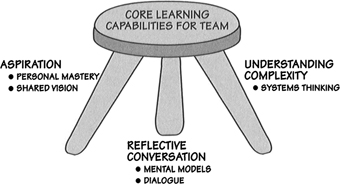
Even more important for me was Demings idea that a common system of management governed modern institutions, and in particular formed a deep connection between work and school. He would often say, We will never transform the prevailing system of management without transforming our prevailing system of education. They are the same system. So far as I know, his insight into this connection between work and school was original.
I believe that Deming came to this realization late in his life, in part as a way to make sense of why so few managers seemed able to actually implement real Quality Management as he conceived it. People failed, he realized, because they had been socialized in ways of thinking and acting that were embedded in their most formative institutional experiences. The relationship between a boss and subordinate is the same as the relationship between a teacher and student, he said. The teacher sets the aims, the student responds to those aims. The teacher has the answer, the student works to get the answer. Students know when they have succeeded because the teacher tells them. By the time all children are 10 they know what it takes to get ahead in school and please the teachera lesson they carry forward through their careers of pleasing bosses and failing to improve the system that serves customers. After Dr. Deming passed away in 1993, I spent many years thinking and talking with
- Management by measurement:
Focusing on short-term metrics
Devaluing intangibles
(You can only measure 3 percent of what matters W.E. Deming)
- Compliance-based cultures
Getting ahead by pleasing the boss
Management by fear
- Managing outcomes
Management sets targets
People are held accountable for meeting management targets (regardless of whether they are possible within existing system and processes)
- Right answers vs. wrong answers
Technical problem solving is emphasized
Diverging (systemic) problems are discounted
- Uniformity
Diversity is a problem to be solved
Conflict is suppressed in favor of superficial agreement
- Predictability and controllability
To manage is to control
The holy trinity of management is planning, organizing, controlling
- Excessive competitiveness and distrust
Competition between people is essential to achieve desired performance
Without competition among people there is no innovation
(Weve been sold down the river by competition W.E. Deming)
- Loss of the whole
Fragmentation
Local innovations do not spread
Today, most managers probably regard the Quality Management revolution, like the organizational learning fad of the early 1990s, as history, far from the frontiers of todays challenges. But is that because we have achieved or abdicated the transformation Deming advocated? It is hard for me to contemplate a list like this one and not feel that these maladies still afflict most organizations today, and that it will take generations, not years, to change such deeply embedded beliefs and behaviors. Indeed, perhaps the most obvious question for many of us is: Will this system of management ever change on a large scale? Answering deep questions like this about the future requires looking carefully at the present.





